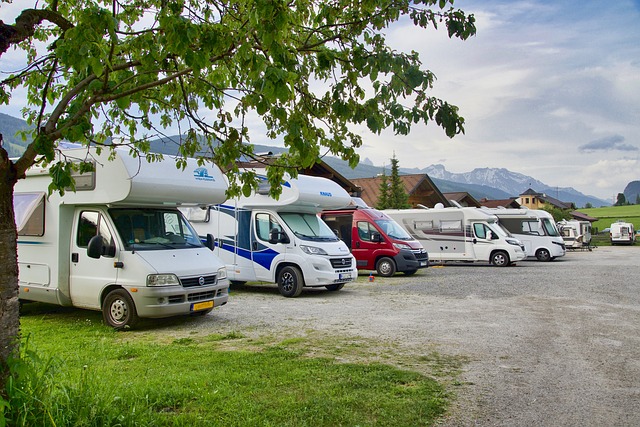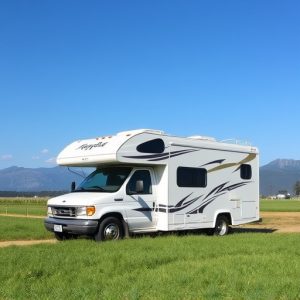Mastering Safe RV Journeys: Your Ultimate Guide to Emergency Preparedness
Planning an RV trip requires meticulous preparation to ensure a safe and enjoyable journey. Essenti…….

Planning an RV trip requires meticulous preparation to ensure a safe and enjoyable journey. Essential steps include performing regular maintenance on your RV, such as inspecting tires, monitoring fluid levels, and verifying the functionality of water, gas, electrical, and propane systems. Adherence to local driving laws, which can vary by region or country, is crucial. Route planning should account for road conditions, weight limits, and rest stop availability. Safety is paramount; RVers must be knowledgeable in emergency procedures and maintain an updated first-aid kit, toolbox, and safety equipment like fire extinguishers and carbon monoxide detectors. In emergencies, having a clear plan with contacts for roadside assistance, local authorities, and healthcare facilities is essential. Staying informed about weather conditions and being ready to adapt travel plans is also important. By following these RV Travel Tips, you'll be prepared for the unique challenges of RV travel, ensuring a secure and comfortable adventure.
Embarking on an RV adventure offers unparalleled freedom and experiences, yet the journey comes with its own set of safety considerations. This comprehensive guide is tailored for RVers seeking to enhance their travel experience with robust safety practices and emergency preparedness measures. We delve into essential RV travel tips that underscore the importance of proactive planning and vigilance on the road. From maintaining your vehicle to understanding the unique challenges of weather and communication, this article provides a peace-of-mind checklist for RVers. Each section is designed to equip you with the knowledge and tools necessary to navigate safely, confidently, and securely, ensuring that your travels are as enjoyable as they are responsible.
- Essential RV Travel Tips: A Comprehensive Guide to Safe Journeys
- – Understanding the Importance of Safety in RV Travel
Essential RV Travel Tips: A Comprehensive Guide to Safe Journeys

Embarking on an RV trip offers a unique blend of adventure and comfort, allowing travelers to explore new destinations while enjoying the familiarity of their home on wheels. To ensure safe and enjoyable journeys, it’s crucial to follow a set of RV Travel Tips tailored for different terrains and situations. Firstly, always perform routine maintenance checks on your RV before hitting the road. This includes inspecting tires for wear and proper inflation, checking fluid levels, and ensuring all systems, from the water and gas to the electrical and propane, are functioning correctly. Secondly, familiarize yourself with local driving laws, as they can vary significantly from state to state or country to country. Additionally, plan your routes ahead of time, taking into account road conditions, weight limitations, and rest areas.
Furthermore, never underestimate the importance of understanding emergency procedures specific to your RV. Keep an updated first-aid kit readily accessible, along with a well-stocked toolbox for minor repairs. It’s also wise to have a fully charged fire extinguisher and carbon monoxide detectors installed. In case of emergencies, always have a clear plan that includes contact information for roadside assistance, local authorities, and a list of nearby healthcare facilities. Lastly, stay informed about weather conditions and be prepared to adapt your travel plans accordingly. By adhering to these RV Travel Tips, you can enhance your safety and peace of mind, allowing you to focus on the joy of the journey rather than the concerns of the road.
– Understanding the Importance of Safety in RV Travel

When embarking on RV travel, prioritizing safety is paramount for a secure and enjoyable journey. RVers must be vigilant about maintaining their vehicle’s integrity, understanding potential hazards, and staying informed on weather conditions that could impact their route. Regular maintenance checks can prevent unexpected mechanical failures, which are more challenging to address in remote locations. Moreover, familiarizing oneself with the specific safety features of one’s RV, such as smoke detectors, carbon monoxide detectors, and fire extinguishers, is crucial for timely responses to emergencies.
Emergency preparedness for RV travel extends beyond having the right equipment; it involves developing a well-thought-out plan. This includes knowing evacuation routes, having a fully stocked first-aid kit, and possessing a comprehensive emergency contact list. Travelers should also consider the specific safety concerns that come with RV travel, such as handling propane gas safely, securing belongings against theft, and understanding the risks of extreme weather conditions in different environments. By integrating RV travel tips focused on safety into your trip planning, you can enhance your peace of mind and ensure a more secure experience on the road.
RV travel offers an unparalleled adventure, allowing individuals to explore diverse landscapes comfortably. To ensure these journeys remain safe and enjoyable, it’s crucial to heed essential RV travel tips. This comprehensive guide has outlined the importance of safety measures, from routine vehicle checks to having a well-prepared emergency plan. By following these guidelines, RVers can navigate their travels with confidence, knowing they are prepared for any situation. With these practices in place, the road ahead is not just a path of discovery but one where safety is integrated into every mile, providing peace of mind for a secure and fulfilling RV experience.







